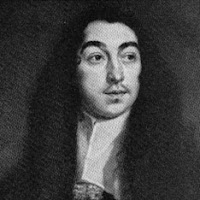The text reads:
When David heard that Absalom was slain, he went up to his chamber over the gate,
And wept, and thus he said: O my son Absalom, would God had I died for thee!
 |
| Thomas Tomkins 1572 - 1656 |
Tomkins was a Welsh composer from the late tudor period, and belonged to several elitist groups of composers known for their talents particularly in a capella composition. Out of the two, Tomkins' setting of the text may seem the simpler. However, if you listen more closely, the most interesting aspect of this work (and of the musical style at the time) is the constant change between major and minor that paints a picture of grief very well. The most beautiful moments are perhaps in the quieter sections in which the high tenor and alto entries carry a single line, that develops into all five voice parts (SAATB) singing the phrases back and forth until coming to a homophonic texture at the end of the phrases. An example of these tender solo moments is at 1.27 where the tenor and alto blend together unnoticeably until splitting into separate parts.
 |
| Eric Whitacre Born 1970 |
In complete contrast to the typical (yet beautiful) sounds of Tomkins' ancient polyphony, Eric Whitacre's setting of the music is slightly different - obviously because of the additional modern influences that he has as a contemporary composer. For me, this setting is the more powerful of the two as it has contrasted sections, dissonant harmonies and an almost minimalistic feel as it stays on the same phrase several times - (I'm sure as an intention by Whitacre to emphasise the emotions portrayed in the text). As well as this, the setting is for more voices: SSAATTBB which creates a bigger sound and a more atmoshperic feel in the piece, and Whitacre uses silence as well as music to create dramatic effect. However, one similarity is the composer's use of solo phrases, particularly the phrase: 'Absalom my son' in the second section.
However, this is only my personal opinion, and I do of course love both pieces. Here are the two for you to listen to and make your own judgement. Although be warned, Whitacre's setting is over fifteen minutes! (In my opinion, it's still worth it).
When David Heard - Thomas Tomkins
When David Heard - Eric Whitacre
No comments:
Post a Comment